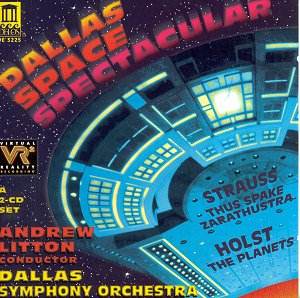Andrew Litton is conductor who has established
a strong reputation on either side of Atlantic, and this is the
kind of repertoire in which he excels. The idea behind this advantageously
priced 2CD set is clear enough in the title: ‘Dallas Space Spectacular’.
These two pieces have their extra-musical associations, and they
are also showpieces bound to give an orchestra the opportunity
to shine. And shine is precisely what the Dallas musicians do.
At a total of not much more than 80 minutes,
two discs can almost be regarded as an indulgence, only just beyond
the time limitation of a single CD. The package is slimline but
the design is gaudy, to say the least, although once the booklet
is opened it is a model of propriety and clear presentation.
The same might be said also of Andrew Litton's
performances. The general pacing and shaping of Also Sprach
Zarathustra allows each section of the piece to evolve with
a strong sense of its purpose in the larger scheme. Not that this
is done at the expense of the sonic spectacular which this music
can offer a virtuoso orchestra. The Delos recording sees to that,
as the full-toned climax of the opening ‘sunrise’ reveals (Track
1: 1.00). But if anything the most impressive aspect of the sound
is the atmospheric handling of the quieter passages. Strauss's
score is notorious for its complex web of divided string textures,
so it is particularly satisfying that the dark sinews of Von
der Wissenschaft (Of Learning) emerge with such clarity
but at a genuine pianissimo (Track 6: 0.00). If there is a criticism
of the performance it probably lies in the other direction, that
occasionally the last degree of fire and passion is lacking. However,
in a major orchestral work the purpose of detail must be to serve
the larger scheme, and judged on that premise Litton's performance
is richly rewarding, as it has always been in the concert hall
too.
With its seven distinctive movements The Planets
covers a wide range of expression, and remains the best introduction
to the rewards to be found in Holst's work. The opening movement,
Mars, the Bringer of War, is tightly controlled at a logical
and strict tempo, while the sheer intensity of the music emerges
in the dynamic range, which is handled so capably by the recording
engineers. The ending is uncompromisingly powerful, just as Holst
intended (Track 1: 6.40).
Then the second movement, Venus, the Bringer
of Peace, takes us to the other extreme: light, delicate,
gentle. To some extent this music is so well written for the orchestra
that its accurate delivery will ensure success; but there is more
to it than that as the sequence proceeds, The Winged Messenger
Mercury releasing Jupiter, the Bringer of Jollity,
with Holst's most famous tune at its centre. However, the sternest
tests confronting performers of this work are found in the later
stages, in Saturn, Uranus and Neptune.
Litton balances these three movements particularly
well, the inexorable pulse of Saturn, as the Bringer
of Old Age, contrasting with the incisive rhythms that open
up the different world of Uranus, the Magician. The obsessive
motto rhythm of the latter makes a striking impression (Track
6: 0.00). At the end of this movement the music transforms as
if to move us into another state, and the Mystic Neptune emerges.
Played at pianissimo dynamic throughout, the requirement is of
absolute concentration among both players and audience, until,
half way through, the remote voices of the off-stage women's chorus
take the music through to its close.
This is a well-shaped and most satisfying account
of Holst's masterpiece, from a conductor who has performed the
work many times in the concert hall. The balancing of power and
atmosphere is admirably achieved, and if the two-disc package
appeals, it will not disappoint.
Terry Barfoot
